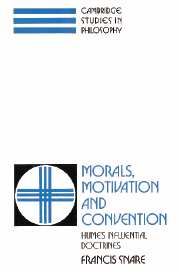Book contents
- Frontmatter
- Contents
- Acknowledgements
- NOTE
- Introduction
- Part I The argument for sentimentalism
- Part II The problems and consequences of sentimentalism
- 6 Continuity and circularity
- 7 The problem with justice
- 8 The conservative theory of justice
- 9 Convention and institutional facts
- 10 Convention and the regard to justice
- Bibliography
- Index
7 - The problem with justice
Published online by Cambridge University Press: 05 June 2012
- Frontmatter
- Contents
- Acknowledgements
- NOTE
- Introduction
- Part I The argument for sentimentalism
- Part II The problems and consequences of sentimentalism
- 6 Continuity and circularity
- 7 The problem with justice
- 8 The conservative theory of justice
- 9 Convention and institutional facts
- 10 Convention and the regard to justice
- Bibliography
- Index
Summary
No doubt Hume had a number of reasons to be interested injustice and the judgments of justice and injustice that we make. But there is also a special theoretical reason for discussing the subject in Book III. The theory of morals developed in Part i has a special (circularity) problem in regard to what Hume calls ‘justice’ and that problem is what he immediately takes up in the first section of Part ii. It is in that regard that Hume is particularly concerned to distinguish the ‘artificial virtues’ from the ‘natural virtues’, arguing that the virtue of justice is artificial in an important sense. One feels things would have been so much easier for Hume if our ordinary moral judgments were only attributions of ‘natural virtues’, that is, if we made no justice judgments. His theory of morals, in that case, would have benefitted from a plausibility born of simplicity. It would have had no hard cases to deal with.
So the basic question we ask in this chapter is: ‘What is the problem that threatens Hume's theory of morals in the case of justice and the artificial virtues but which doesn't threaten it in the case of the natural virtues?’ That is, ‘What is the special problem that arises in regard to justice?’ But this question cannot be discussed without raising a second question at the same time: ‘What exactly is this distinction between the artificial and the natural virtues and, indeed, what is the point of making that distinction?’
- Type
- Chapter
- Information
- Morals, Motivation, and ConventionHume's Influential Doctrines, pp. 176 - 201Publisher: Cambridge University PressPrint publication year: 1991



